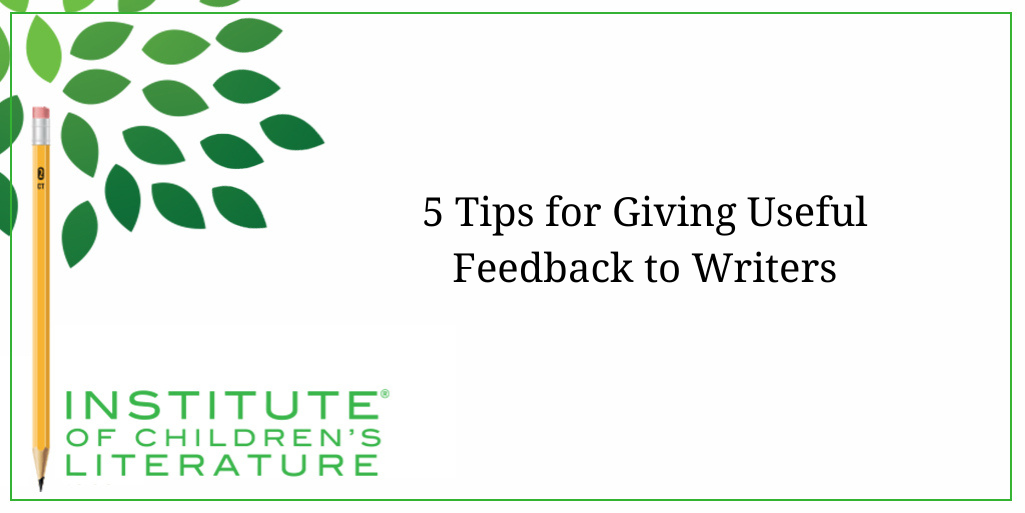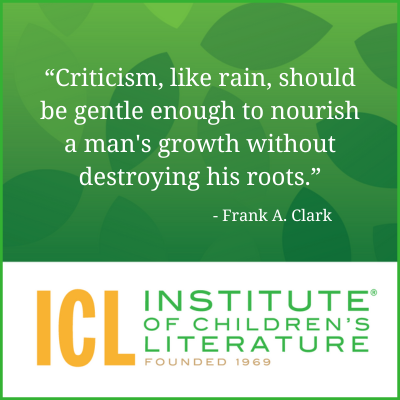
5 Ways Writers Can Prep for 2025 Goal Setting
Before we roll on to the new writing year, let’s harness our optimism for the blank slate before us and prepare for our 2025 Goal Setting just for writers.

If you continue your writing journey long enough, someone is going to ask you to read their writing and ask what you think. It can happen in a critique group. It can happen at workshops. It’s even happened to me when we had a yard sale and my darling daughter told a potential customer I was a writer. As a result, learning to give good feedback is well worth your time.

Often, people who aren’t comfortable giving feedback will simply offer praise. Usually something vague. “This is really good.” “I liked this a lot.” By being nonspecific, they don’t have to worry about saying the wrong thing and making the writer unhappy. But good feedback is all about helping. It isn’t that praise isn’t helpful.
Praise has value, especially if given honestly and specifically. It helps writers pinpoint what they are doing right. A bright writer often notices the areas avoided in praise feedback, which can suggest those unmentioned areas need work. Praise can also be uplifting when writers are going through hard times or periods of self-doubt. But as helpful as praise is, it doesn’t tend to spur improvement. It’s only half of the feedback opportunity.
When a writer asks for feedback, I also ask what they’re hoping to get back. This helps me understand the places where the person is unsure. It can also alert me to whether the issue I spot is a blind spot for the writer, and that shapes how I approach trying to offer suggestions for improvement in areas the author may not have known were problems.

In a situation where I sense the person doesn’t really want feedback, I will seek out something positive to say about the piece and one thing to draw the person’s attention to. And I’ll stop there. People who weren’t expecting to need to revise can get very overwhelmed by a lot of improvement-oriented feedback, so I tread lightly. In these cases, even one suggestion for improvement can get pushback. When pushback comes, I don’t defend my feedback. I simply wish the person well and move on.
One important element of feedback is that it cannot be based on how you would write the story, article, or essay. Generally, I would approach most pieces I’ve critiqued differently than the writer did. But my feedback isn’t based on trying to turn the writer into me. Yes, I’ve had some success (in that I make a living at writing), but I’m far from the world’s best writer. Trying to turn other writers into me will be doing them a disservice.

One of the best ways to hear the voice of the person you’re helping is to read the work aloud. Then make note of places where you stumbled, where you had to reread to get the words right, or where you were confused. Reading aloud is one of the best possible ways to spot problems (in your own writing or the writing of others). It’s also one of the best possible ways to get used to the voice of the writer you are helping. That will make it easier to be helpful without disrupting that voice.
Never forget that being corrected isn’t the most comfortable process. Feedback pinches, even when it’s done well and even when it’s exactly what the person needs to hear. For feedback to have any value, it needs to be honest. But for feedback to be received, it needs to be kind. Almost all of us have heard of the “critique sandwich,” where you start with something positive, then point out a flaw, and then end on a positive note. It’s so recognizable that people often recognize it when you’re doing it, but a critique sandwich is still worth serving as long as all of the ingredients are honest.

“I loved this character. He’s so real and fresh. But I couldn’t always understand his dialogue. The use of dialect was interesting. But it could be hard to figure out without repeat readings. I think it would have been easier to read and understand if you kept the unique word choices and word order, but not the dialect spellings of words. He had some of the best, funniest lines in the story. I wanted to understand them more easily, so I didn’t have to work so hard to get the joke.”
Now if you didn’t like the character and thought he was boorish and annoying, this feedback loses a great deal of its worth. Don’t praise the things that fell flat for you.
If you’re not being hired professionally for your feedback, no one expects you to catch every single problem in a story, article, picture book manuscript, etc. This is especially true if you’re part of a critique group. Since you aren’t the only person who is going to give feedback, there is no reason to try to catch every single thing.
I learned this lesson when I joined a critique group. I had been a writing teacher (in a community college and for the ICL’s writing courses). I was used to needing to catch everything. But in a critique group, that was way too much to load on someone. Friendly critique doesn’t need to be so extensive. The best critique group or casual critique will focus on a few key spots (both good and problematic) that jumped out at you as you read. Be sure to mix praise and correction, but don’t feel like you need to do everything.

Giving feedback can be scary. You can’t always be sure how the other person will react. Personally, I hate conflict, so I struggled with that when I was first giving feedback. But as I learned to both reinforce what was good and point out what is a problem (usually with why it might be a problem), I found the writers I worked with grew so much and were better able to find their own success.
Seeing a fellow writer succeed, knowing you played a small part, is one of the best feelings in the world. I highly recommend it. The next time you’re in a position to give feedback, step up. Be brave. And remember that we’re all in this together.
With over 100 books in publication, Jan Fields writes both chapter books for children and mystery novels for adults. She’s also known for a variety of experiences teaching writing, from one session SCBWI events to lengthier Highlights Foundation workshops to these blog posts for the Institute of Children’s Literature. As a former ICL instructor, Jan enjoys equipping writers for success in whatever way she can.

Before we roll on to the new writing year, let’s harness our optimism for the blank slate before us and prepare for our 2025 Goal Setting just for writers.

Writers can be thin-skinned when it comes to getting feedback on their work. Let’s look at 4 ways to positively deal with constructive criticism!

Rejection is part of the territory when it comes to being a writer. Today we offer reflection for writers to help redirect your efforts after a rejection.
1000 N. West Street #1200, Wilmington, DE 19801
© 2024 Direct Learning Systems, Inc. All rights reserved.
1000 N. West Street #1200, Wilmington, DE 19801
© 2024 Direct Learning Systems, Inc. All rights reserved.
1000 N. West Street #1200, Wilmington, DE 19801
© 2024 Direct Learning Systems, Inc. All rights reserved.
1000 N. West Street #1200, Wilmington, DE 19801
© 2024 Direct Learning Systems, Inc. All rights reserved.

1000 N. West Street #1200, Wilmington, DE 19801
© 2025 Direct Learning Systems, Inc. All rights reserved.

1000 N. West Street #1200, Wilmington, DE 19801
©2025 Direct Learning Systems, Inc. All rights reserved. Privacy Policy.
2 Comments
This was great! So many writers are afraid to give or receive critique. It’s hard to be on the receiving end, no matter how long you’ve been there. However, I’ve learned to see most things pointed out as someone caring enough to help me do better. With that view, I’m able to accept most feedback as coming from a place of support, not attack. And when I can see what they are saying makes sense, it makes me happy. One piece of advice I give anyone who joins our critique group is to come with nothing to read for the first few meetings, so they can see how we work and begin helping others with feedback. That way, they can realize firsthand that we are supporting each other with our finds, not tearing each other down. Also, it seems to soften some of the initial sting when their own work is finally critiqued. Being part of a very supportive group is so rewarding!
Hi Renee’
Thanks for posting and for giving such great advice!